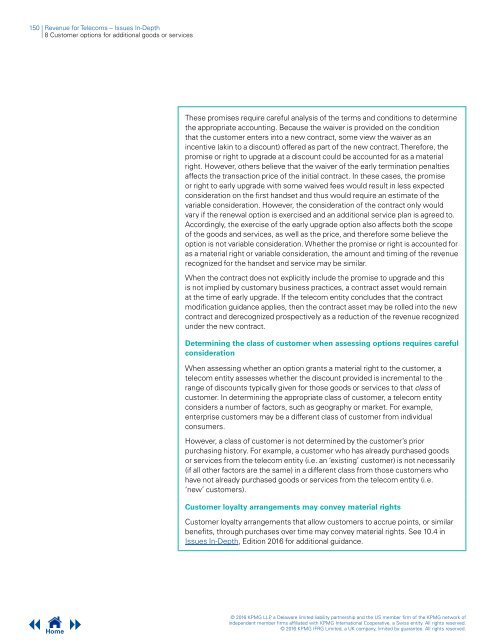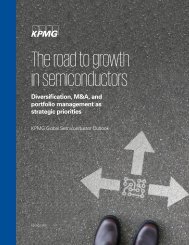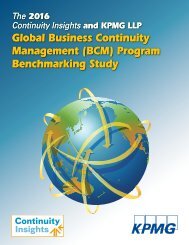Revenue for Telecoms
2cdncba
2cdncba
Create successful ePaper yourself
Turn your PDF publications into a flip-book with our unique Google optimized e-Paper software.
150 | <strong>Revenue</strong> <strong>for</strong> <strong>Telecoms</strong> – Issues In-Depth<br />
| 8 Customer options <strong>for</strong> additional goods or services<br />
These promises require careful analysis of the terms and conditions to determine<br />
the appropriate accounting. Because the waiver is provided on the condition<br />
that the customer enters into a new contract, some view the waiver as an<br />
incentive (akin to a discount) offered as part of the new contract. There<strong>for</strong>e, the<br />
promise or right to upgrade at a discount could be accounted <strong>for</strong> as a material<br />
right. However, others believe that the waiver of the early termination penalties<br />
affects the transaction price of the initial contract. In these cases, the promise<br />
or right to early upgrade with some waived fees would result in less expected<br />
consideration on the first handset and thus would require an estimate of the<br />
variable consideration. However, the consideration of the contract only would<br />
vary if the renewal option is exercised and an additional service plan is agreed to.<br />
Accordingly, the exercise of the early upgrade option also affects both the scope<br />
of the goods and services, as well as the price, and there<strong>for</strong>e some believe the<br />
option is not variable consideration. Whether the promise or right is accounted <strong>for</strong><br />
as a material right or variable consideration, the amount and timing of the revenue<br />
recognized <strong>for</strong> the handset and service may be similar.<br />
When the contract does not explicitly include the promise to upgrade and this<br />
is not implied by customary business practices, a contract asset would remain<br />
at the time of early upgrade. If the telecom entity concludes that the contract<br />
modification guidance applies, then the contract asset may be rolled into the new<br />
contract and derecognized prospectively as a reduction of the revenue recognized<br />
under the new contract.<br />
Determining the class of customer when assessing options requires careful<br />
consideration<br />
When assessing whether an option grants a material right to the customer, a<br />
telecom entity assesses whether the discount provided is incremental to the<br />
range of discounts typically given <strong>for</strong> those goods or services to that class of<br />
customer. In determining the appropriate class of customer, a telecom entity<br />
considers a number of factors, such as geography or market. For example,<br />
enterprise customers may be a different class of customer from individual<br />
consumers.<br />
However, a class of customer is not determined by the customer’s prior<br />
purchasing history. For example, a customer who has already purchased goods<br />
or services from the telecom entity (i.e. an ‘existing’ customer) is not necessarily<br />
(if all other factors are the same) in a different class from those customers who<br />
have not already purchased goods or services from the telecom entity (i.e.<br />
‘new’ customers).<br />
Customer loyalty arrangements may convey material rights<br />
Customer loyalty arrangements that allow customers to accrue points, or similar<br />
benefits, through purchases over time may convey material rights. See 10.4 in<br />
Issues In-Depth, Edition 2016 <strong>for</strong> additional guidance.<br />
Home<br />
© 2016 KPMG LLP, a Delaware limited liability partnership and the US member firm of the KPMG network of<br />
independent member firms affiliated with KPMG International Cooperative, a Swiss entity. All rights reserved.<br />
© 2016 KPMG IFRG Limited, a UK company, limited by guarantee. All rights reserved.







